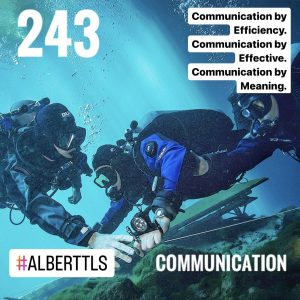Communication by Efficiency. Communication by Effective. Communication by Meaning.
Abstract
The 21st century has brought about significant changes in how people communicate and interact, necessitating the development of effective and efficient communication skills to navigate personal and professional relationships successfully. This article explores the critical components of good communication, including active listening, clarity and conciseness, nonverbal communication, and emotional intelligence. It also discusses practical strategies to improve these skills, such as practicing active listening, enhancing nonverbal communication, developing emotional intelligence, and seeking feedback. By fostering effective and efficient communication, individuals can build better relationships, minimize misunderstandings, and succeed tremendously in various aspects of their lives. The article contributes to a better understanding of the importance of communication skills in the 21st century. It offers valuable insights into how individuals can enhance these essential life skills to thrive in an increasingly interconnected world.
Introduction
Effective and efficient communication is a vital life skill in the 21st century, and it plays a significant role in both personal and professional relationships. The ability to communicate effectively can bring appeal to points of interaction, making it an essential skill for success in today's fast-paced world (Wagner, 2010). This article will discuss the importance of effective and efficient communication, the critical components of good communication, and practical strategies to improve communication skills.
Importance of Effective and Efficient Communication
Effective communication is critical for various reasons. Firstly, it fosters better relationships, as understanding one another's perspectives helps build trust and rapport (Wagner, 2010). Secondly, effective communication contributes to personal and professional success by enabling individuals to express their ideas clearly and persuasively (Kuzmenko & Andryushchenko, 2019). Lastly, it helps to minimize misunderstandings, which can lead to conflicts and inefficiencies in the workplace (Riggio, 2017).
Key Components of Good Communication
- Active Listening
Active listening focuses on understanding and responding to the speaker's message (Riggio, 2017). This skill involves hearing the words and interpreting the speaker's tone, body language, and emotions. Active listening promotes understanding and empathy, leading to more effective communication.
- Clarity and Conciseness
Being clear and concise is vital for efficient communication. The message should be easy to understand, free from jargon, and straight to the point (Kuzmenko & Andryushchenko, 2019). This reduces the chances of misinterpretation and improves the overall quality of communication.
- Nonverbal Communication
Nonverbal communication includes gestures, facial expressions, posture, and eye contact (Wagner, 2010). Awareness of one's nonverbal cues and interpreting those of others can significantly enhance communication effectiveness.
- Emotional Intelligence
Emotional intelligence is the ability to recognize, understand, and manage one's emotions and those of others (Riggio, 2017). This skill is essential for effective communication, as it allows individuals to adapt their communication style based on the emotions and needs of their audience.
Practical Strategies to Improve Communication Skills
- Practice Active Listening
Active listening can be practiced by giving undivided attention to the speaker, avoiding interruptions, and providing feedback through summarizing, paraphrasing, or asking open-ended questions (Kuzmenko & Andryushchenko, 2019). This helps ensure the listener understands the message and allows the speaker to clarify any misinterpretations.
- Enhance Nonverbal Communication Skills
Awareness of one's body language and the messages it conveys can improve communication effectiveness (Wagner, 2010). Maintaining eye contact, adopting an open posture, and using gestures that match the spoken message can all contribute to better communication.
- Develop Emotional Intelligence
To develop emotional intelligence, individuals can practice self-awareness, self-regulation, and empathy (Riggio, 2017). This includes recognizing one's emotional triggers, managing emotional reactions, and putting oneself in other's shoes to understand their feelings and perspectives better.
- Seek Feedback
Constructive feedback is invaluable for improving communication skills. By actively seeking feedback from peers, supervisors, or mentors, individuals can identify areas for improvement and develop strategies to address them (Kuzmenko & Andryushchenko, 2019).
Conclusion
In conclusion, effective and efficient communication is a crucial life skill in the 21st century. It appeals to interaction points and contributes to personal and professional success. Individuals can enhance their communication abilities by understanding the critical components of good communication, such as active listening, clarity and conciseness, nonverbal communication, and emotional intelligence. Furthermore, one can continuously improve their communication skills by implementing practical strategies like practicing active listening, enhancing nonverbal communication skills, developing emotional intelligence, and seeking feedback.
Ultimately, effective and efficient communication is essential for fostering better relationships, minimizing misunderstandings, and promoting collaboration. As the world becomes increasingly interconnected, the ability to communicate effectively across diverse cultures, backgrounds, and contexts is more important than ever. By investing time and effort in developing strong communication skills, individuals can navigate the complexities of the 21st century with greater ease and success.
References
- Kuzmenko, T. A., & Andryushchenko, L. B. (2019). Developing the 21st-century skills in the modern world: Communicative competence in focus. Journal of Social Studies Education Research, 10(2), 181-197.
- Riggio, R. E. (2017). Listening and interpersonal communication. In The Oxford Handbook of Listening in Interpersonal Communication. Oxford University Press.
- Wagner, T. (2010). The global achievement gap: Why even our best schools don't teach the new survival skills our children need and what we can do about it. Basic Books.

